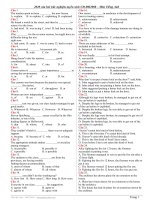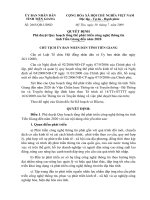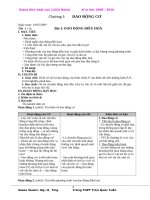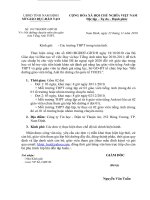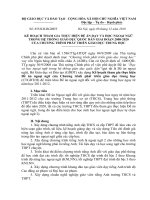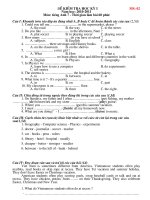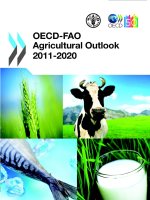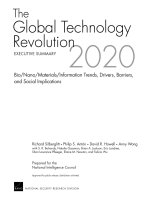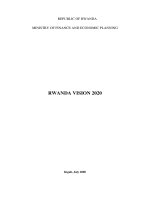2020
Bạn đang xem bản rút gọn của tài liệu. Xem và tải ngay bản đầy đủ của tài liệu tại đây (103.25 KB, 2 trang )
<span class='text_page_counter'>(1)</span><div class='page_container' data-page=1>
<b>TUẦN 23(1): </b>
<b>UNIT 8 :ENGLISH SPEAKING COUNTRIES</b>
<b> (CÁC QUỐC GIA NÓI TIẾNG ANH)</b>
<b>A.REVIEW : Conditional sentences</b>
<b>1.Conditional sentences type1(câu điều kiện loại 1) : diễn tả điều kiện có thể xảy ra</b>
<b> IF + S+ V(s.present) , S + will/can + V</b>
Ex: If the factory <i>continues </i>dumping poison into the lake, all the fish <i>will die</i>
<i><b>2.Conditional sentences type2 (câu điều kiện loại 2): diễn tả điều kiện khơng có thật ở hiện tại</b></i>
<i><b> IF +S + V(s.past) , S + could/would/might + V</b></i>
Ex: If I <i>were</i> you , I <i>would help</i> her
+ Notes: - Trong mệnh đề IF động từ To Be chúng ta có thể dùng was/ were khi chủ từ là I/He/She/It
- Mệnh đề If có thể nằm đầu câu hoặc cuối câu, nếu nằm đầu câu giữa 2 mệnh đề có dấu
phẩy
<b>B. Vocabulary</b>
1. native speaker (n): người nói bản xứ
2. official language (n): ngơn ngữ chính thống
3. mother tongue (n)= native language: tiếng mẹ đẻ
4.absolutely(adv): tuyệt đối
5. to look forward to+ V-ing: mong chờ
6.accent (n): ngữ điệu
7.symbol (n): vật tượng trưng-> to symbolise : tượng trưng
8.unique (a): độc đáo
9. legend (n): truyền thuyết-> legendary (a): mang tính truyền thuyết
10. to attract : thu hút -> attraction(n): sự thu hút
11. to take place = to happen: xảy ra
12. to haunt : ám ảnh
13. to explore : khám phá
14.paradise(n): thiên đường
15.castle (n): lâu đài
<b>C. Pronunciation</b>: Stress in words ending –ese and –ee
Những từ tận cùng –ese và –ee thì trong âm đặt ngay âm cuối
Ex: Japa’nese employ’ee interview’ee
EXERCISES
<b>I. Find the word which has different sound in the part underlined.</b>
1. A. wanted B. washed C. needed D. decided
2. A. ago B. boring C. explore D. historic
3. A. come B. host C. open D. cold
4. A. mention B. question C. pollution D. education
5. A. boxes B. washes C. goes D. watches
<b>II. </b>
<b>Find the word which has different stress pattern from the others.</b>
1. A. coffee B. rupee
C. trainee
D. agree
</div>
<span class='text_page_counter'>(2)</span><div class='page_container' data-page=2>
3. A. practice B. festival
C. native D. unique
4.A. government B. celebrate
C. official
D. popular
5.A. Canadian
B. Australia
C. Chinese
D. Japanese
<b>III. Choose the correct words to complete the sentences</b>
1. This animal, the ______, is a symbol of Australia.
<i> A. kangaroo</i> <i>B. koala</i> <i>C. rabbit</i> <i>D. tiger</i>
2. Do you know that the telephone, the TV and penicillin are Scottish ______.
<i>A. inventors</i> <i>B. inventor</i> <i>C. inventions</i> <i>D. invention</i>
3. Noise pollution can lead to ________loss.
<i>A. looking</i> <i>B. hearing</i> <i>C. listening</i> <i>D. reading</i>
4. Have you come _______ solutions to this problem?
<i>A. up to</i> <i>B. to with</i> <i>C. up with</i> <i>D. on to</i>
5. What is the name of the most famous clock in Britain?
A. Big Clock B. Big John C. Big Apple D. Big Ben
6. Loch Ness is ……...
A. a person B. a valley C. a lake D. a river
7. If you the president, what would you do to help the environment?
<i>A. would be</i> <i>B. are</i> <i>C. had been</i> <i>D. were</i>
8. Don’t drink that water. It’s .
<i>A. contaminated </i> <i>B. pure</i> <i>C. damaged</i> <i>D. dumped</i>
9. Which country doesn't speak English as an official language?
A. England B. Australia C. Singapore D. Korea
<i>10.</i> . Trafalgar is….
. A. a cape B. a town C. a square D. a bay
11. If the factory ________________ dumping poison into the lake, all the fish and other
aquatic animals will die.
A. continues B. to continue C. continued D. will continue
12. If we ______________ water carefully, more people will have fresh water.
A. will use B. would use C. using D. use
13. If I were you , I ______________ that car .
A. would buy B. buy C. bought D. buying
14. If we recycle more , we ________________ the Earth.
A. help B. would help C. helping D. will help
15.The USA,the United Kingdom,New zealand are all____________
</div>
<!--links-->
